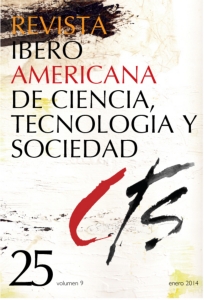Scientific knowledge, disasters and public policy
(Presentation)
DOI:
https://doi.org/10.52712/issn.1850-0013-616Abstract
La propuesta de este dossier es acercar a los lectores de CTS un campo de investigación y reflexión incipiente en la región iberoamericana, así como también contribuir a su desarrollo y difusión. Los artículos incluidos en esta compilación han sido preparados por autores iberoamericanos que, aplicando un enfoque basado en el análisis de las relaciones entre ciencia, tecnología y sociedad (CTS), abordan algunas de las muy diversas dimensiones en que se expresa la relación entre desastres y conocimiento científico y tecnológico.
Downloads
References
BIJKER, W. E. (2006): “The Vulnerability of Technological Culture”, en H. Nowotny: Cultures of Technology and the Quest for Innovation, New York, Berghahn Books, pp. 52-69
FRODEMAN, R. (2007): “Nueva Orleans, paisaje y Eros”, Revista Iberoamericana de Ciencia, Tecnología y Sociedad, vol. 3, nº 8, abril de 2007, pp. 81-95.
FUNTOWICZ, S. y RAVETZ, J. (1992): “Three types of risk assessment and the emergence of post normal science”, en S. Krimsky y D. Gloding (eds.): Social Theories of Risk, Londres, Praeger, pp. 251-273.
GIBBONS, M.; LIMOGES, C.; NOWOTNY. H.; SCHWARTZMAN, S.; SCOTT, P. y TROW, P. (1994): La nueva producción del conocimiento, Barcelona, Pomares- Corredor.
IMOGEN WALL (s/f): Citizen initiatives in Haiti. Disponible en: http://www.fmreview.org/technology/wall.html.
JASANOFF, S. (2004): States of Knowledge: The Co-Production of Science and Social Order, Londres, Routledge.
KRIMSKY, S. y GLODING, D. (1992): Social Theories of Risk. Londres, Praeger.
LÓPEZ CEREZO, J. A. y LUJÁN, J. L. (2000): Ciencia y política del riesgo, Madrid, Alianza.
PESTRE, D. (2005): Ciencia, Política y Dinero, Buenos Aires, Nueva Visión.
SHINN, T. (2000): “Formes de division du travail scientifique et convergence intellectuelle”, Revue Française de Sociologie, n°41, pp. 447-473.
YEO, M. (2013): Lessons Learned from the L’Aquila Earthquake Trial. Call for open session. Disponible en: http://www.4sonline.org/open_sessions.
ZINN, J. (2004): Literature Review: Sociology and Risk, Working Paper 1, Social Contexts and Responses to Risk Network (SCARR), University of Kent, Canterbury.
Fuentes de información consultadas
Centro de desastres y Análisis de Riesgo de la Universidad Estatal de Colorado, Estados Unidos. Disponible en: http://disaster.colostate.edu.
From innovation to revolution. Disponible en: http://irevolution.net/2011/10/13/flowminder -haiti/.
Force Migration Review: http://www.fmreview.org/technology/wall.html.
International Journal of Mass Emergencies and Disasters (IJMED). Disponible en: http://www.ijmed.ordeg.
International Sociological Association - Research Committee on Sociology of Disasters. Disponible en: http://www.isa-sociology.org/rc39.htm.
Red de Estudios Sociales en Prevención de Desastres en América Latina. Disponible en: http://www.desenredando.org/lared/estrategia.html.
Society for Social Studies of Science. Disponible en: http://www.4sonline.org/open _sessions.
Sociological Study of Risk and Uncertainty (SORU). Disponible en: http://www.riskanduncertainty.net/.
STS Forum on the 2011 Fukushima/East Japan Disaster. Center for Science, Technology, Medicine, and Society, University of California, Berkeley. Disponible en: http://fukushimaforum.wordpress.com.
STS Studies of Disasters. Disponible en:
http://fukushima-references.wikispaces.com/STS+Studies+of+Disaster.
Downloads
Published
How to Cite
Issue
Section
License
Copyright (c) 2024 CC Attribution 4.0

This work is licensed under a Creative Commons Attribution 4.0 International License.
All CTS's issues and academic articles are under a CC-BY license.
Since 2007, CTS has provided open and free access to all its contents, including the complete archive of its quarterly edition and the different products presented in its electronic platform. This decision is based on the belief that offering free access to published materials helps to build a greater and better exchange of knowledge.
In turn, for the quarterly edition, CTS allows institutional and thematic repositories, as well as personal web pages, to self-archive articles in their post-print or editorial version, immediately after the publication of the final version of each issue and under the condition that a link to the original source will be incorporated into the self-archive.











